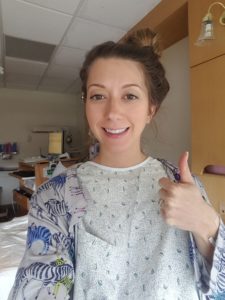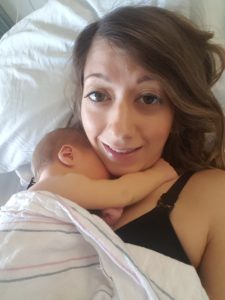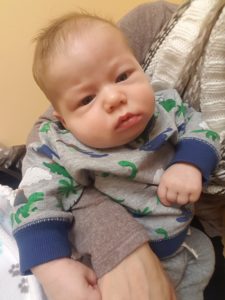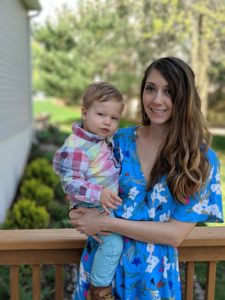Journeying into Motherhood: From Trauma to Transformation
Unexpected trauma and childbirth
This blog was written in 2018 after the birth of my first son.
I have a picture of me when I got to the hospital in labor feeling empowered and “ready to do this”. When I look at that picture now, it makes me feel sad. Sad because despite having a healthy baby, I left feeling pretty broken. I am deeply grateful that I was blessed with a child in the first place, and that I delivered a healthy baby boy. Despite that, it does not erase the negative, emotional response associated with my birth experience.

Fifteen months after giving birth to Wyatt, I finally came to the realization that I was suffering from trauma related to Wyatt’s birth and from our first weeks together.
Over a year after his birth, my best friend was in labor. As I tried to support her (we were texting) and share in her excitement, flashbacks to my experience took over and I became overwhelmed with anxiety and tears. It was at this moment that I had a deep realization that maybe this is more than me just being my emotional, “feelings” self.
Over the past year, intrusive thoughts and flashbacks related to the event commonly flooded my mind. Talking about childbirth with clients and friends triggered discomfort and anxiety. I wanted to push away anything that reminded me of the experience. Whenever I thought of the event, I would feel terribly sad. I didn’t want to relive it so I tried to ignore it, but it always came back to haunt me in some way or another.
I’ve wanted to blog about my experience so many times, but writing about it would become too hard and exhausting for me. I needed hindsight on this and to feel like I was moving forward before I could share my story.
Honestly, I never heard of post-traumatic stress related to childbirth. I thought trauma was something people experienced in very traumatic events like war, sexual abuse, catastrophic situations and tragedy. The birth of my son was not tragic. Him entering this world was beautiful. I felt shame that I could not let this go and move on, especially when there are pregnancy and birth complications that are far worse that what I had experienced. What I didn’t know is that post-traumatic stress is not dependent upon what the traumatic event is, but on the perception of the event. I began reading about similar stories of women who suffered trauma after birth, although the severity of different experiences varied, the trauma was very real for each person. I could relate.
My Birth Story
I completed hypnobirthing classes with my husband and planned to use that as my tool for delivery. If I needed medical intervention, I was open to whatever that needed to happen to deliver Wyatt safely. C-section wasn’t something I was thinking of. My water broke, I was dilated, he was in the right position, and the contractions were definitely present.
From when my water broke at 10pm until 4pm the next day, I labored without intervention. I was doing OK! Pitocin was suggested to speed things along. That’s when I knew birth without an epidural was going to become more difficult as it would speed up my contractions.
By 9pm after suffering through painstaking contractions, I opted for the epidural. Life was great again. Yes, this was not my plan. At that time, I accepted it was the best choice for us. In fact, we were watching How to Get Away with Murder on TV very comfortably when at my surprise the nurses said it was time to start pushing!
I pushed for 1.5-2 hours. I was giving it my all and I had more in me to give. We could even see his head! Due to concern that Wyatt’s heart rate was showing stress and that maybe he wouldn’t fit?… a C-section was recommended. It was a very long day and I had little to no food. At this point it was over 24 hours from my water breaking. I must have been running on endorphins. After I consented to a C-section, I felt defeated and broke down.
The C-section itself was traumatic for me. I was strapped to a table with my arms out beside me feeling completely vulnerable in a helpless kind of way. I was wheeled into the OR shivering and shaking and didn’t know why. While the procedure began, I felt like I couldn’t breathe, although the anesthesiologist assured me I was and my vitals were good. I had to vomit and it felt like I couldn’t catch my breath. It felt like I was going to choke on my own vomit. I panicked and worried I was dying as I felt like I couldn’t keep my eyes open much longer. Everyone around me were calm. I felt alone. My husband didn’t know what to do or say and I couldn’t really blame him. I am sure he was full of emotions too.
Wyatt was born. I can’t remember much. There are pictures to look back on. I know I fell asleep at some point between when my incision was closed and being wheeled into my recovery room. We were able to bond and meet skin to skin. I was finally able to rest.

For the past year, I’ve had a voice in my head telling me that I am over reacting; that I’m not as strong as other women who seem to not be traumatized by their C-section; guilty that I feel this way despite having a healthy baby and that my health was fine too.
We had a rough start…
We moved to our room and finally slept by 4am. Only a few hours later, we were up and it was time to learn how to breastfeed.
I do question if my overall lack of sleep combined with dissociative drugs, negatively impacted my perception of the C-section. Combine that with hormonal changes following birth and it sounds like a good recipe for some mental and emotional difficulties to follow.
The trauma was not apparent to me in the hospital. Between nurses, doctors, lactation consultants, and visitors in and out of the room, my actual feelings were distracted. Focusing my attention on learning how to nurse Wyatt and care for a newborn were priorities over my feelings and needs.
When I came home from the hospital with Wyatt in my arms, I ever so gently sat down on the couch in an effort to not move in a way that would cause me to bend at my C-section site. Winston laid at my feet on the ottoman. After spending four days in the hospital, we were finally home. Just four days ago, I had been living my life as I had always been. Now, in the quiet of my own home, I could finally process what I just went through.
I look back at notes I kept in my phone of the first few days of being home. “What the f*** just happened to me over the past four days? I feel like I was broken and then released back into the world without a manual for coping or validation for how I am feeling. ” I felt like a different person.
To me, the birth was pretty traumatic and I have mixed feelings surrounding it that have been hard to deal with and move on from . Although we were finally home and could focus on our new life as a family of three, mental stress, pain, and exhaustion continued. I also wonder if this is why it’s been so difficult to heal.
In retrospect, I view the 4th trimester, especially for a first time mom, as a time for transition, recovery, renourishment, and bonding with baby. When I think of my first six weeks as a mother, pain is the first thought that comes to mind.
I remember sharp pains at my incision site if I moved too much getting off the couch. Getting in and out of bed was a challenge. Sneezing could invoke pain.
I thankfully produced breastmilk and was successfully fueling a thriving newborn. It was excruciating though. My one nipple became cracked. It bled. I was in AGONY. I remember being up for a midnight feeding, sitting as stiff and tense as possible, trying to bare the pain as I hold him as to endure this TORTURE. Yes – I remember thinking, if you want to torture someone, this would be it. I would hold my breath and even curse when he would latch on.
After week 2, mastitis sets in and now I have flu-like symptoms (chills, fatigue, and a fever). Justin is back to work and all I need is someone to take care of ME. Sleep deprivation is also setting in. By week 3, my other nipple is cracked. The pain continues.
Fast forward,Wyatt was diagnosed with a posterior tongue tie that was never caught by anyone before. It’s really hard to diagnose. If it wasn’t for the lactation consultants who had my back and visited me in my home, who were available through text for questions and support, I don’t know what I would’ve done. Wyatt began cranial sacral therapy with a pediatric physical therapist who then referred us to a infant dentist for evaluation for a posterior tongue tie. We had a laser procedure to correct it when he was 2.5 months. Once he began cranial sacral therapy and I adjusted my breastfeeding positions, my nipple pain went from extreme to bearable by 6-8 weeks. It took awhile before it was painless, but we got there.

Breastfeeding worked out for us in the end. We lasted a solid 17 months without the need for any formula. I am SO proud of that after such a rough beginning. I wanted this to work out so badly and I persisted. Part of me felt like I was a failure with birth and I didn’t want this to not work either. Maybe giving up would have been “healthier” for my frame of mind at the time, but I am glad we were able to figure it out. I completely understand why some women choose not to breastfeed or how it just doesn’t work out.
Some things got easier, some things got harder…
Wyatt entered daycare last January. I was sick throughout January to May. Sick with illnesses I haven’t had since childhood. My body felt utterly depleted. Despite eating as much as I possibly could, I could not keep my weight up. Wyatt’s a BIG boy and I really think his needs demanded more than what I was able to physically ingest to keep up.
Wyatt was never a good sleeper. The first night that he “slept through the night” was in June at 8 months old. I developed a caffeine addiction (just 1 cup a day, but I am so sensitive to caffeine). How could I not when I was waking up at least 2-3 times a night for 8 months?
Imagine being hungover from a party in college. You barely slept, but have to go to class. That’s how I felt VERY often for the majority of 2018. In addition, my husband travels for weeks at a time from early spring to summer. I felt isolated often. Juggling business, caring for clients, mom duties, and house stuff became a source of anxiety and stress.

“I’m in a new chapter in my life, and I’m not even trying to be who I was. It’s so beautiful that children do that to you.” – Beyonce
I finally started to get consistent full nights of sleep once Wyatt turned one. Oh my, what sleep does for you. For one, it made me realize how unwell and stressed, physically, I felt for the past year. I compare it to when my clients change their diets and begin to feel amazing and with that, realize that they were feeling pretty shi*ty before. Hindsight can be really powerful. It became easier for me to think again and to see things more clearly.
With feeling more refreshed, I realized I had pushed my needs aside for the past year. Living in fight or flight was my new norm. On a daily basis, I was feeling completely torn between the constant “pulls” in my life. It’s really, really hard for me energetically to balance being a business owner and nutrition therapist, being a wife, being a mom, often in the position of being the only caretaker while my husband travels for work, and meeting my personal needs. If it looks easy, trust me it’s not.
How I am creating more balance in my life
At the beginning of 2019, I had what Gabrielle Bernstein calls, a “miracle moment.” It’s the moment when you begin to choose love over fear. I decided something needed to change. I extended my love in every direction of my life except towards myself. If you are unfamiliar with Gabrielle Bernstein’s work, you can learn more about her here. I discovered her in my mid-twenties and she changed my life.
Moving my body
I started carving exercise into my work day when Wyatt is at daycare. Exercise became a part of my work mornings. It’s a hard commitment to make when I feel pulled towards my work (that I love), but I try my best to keep showing up. It makes me think more clearly, reduces stress, and ultimately makes me work more efficiently on the days that I do it. I’ve gained muscle and strength back and I feel stronger both mentally and physically. I’ve been exercising at Unique+Fit. , a class-based gym that is interesting. It incorporates both weights, boxing, and spurts of cardio. If I wasn’t committing to a class, I wouldn’t be going. The accountability certainly helps.
Changing my priorities and expectations of myself
Days spent home with Wyatt are the most exhausting days. I don’t know how the full time stay at home mamas do it. It’s my choice to be home with him, but it truly is another job. I started to lower my expectations of myself on those days. Do less laundry. Do less cleaning. Stop trying to squeeze work and emails into his nap times. I began journaling and set daily goals that would help me create experiences that would result in elevating my mood and living more fully (I’ve been using Danielle Laporte’s Desire Map Planner). I began meditating using the Insight Timer app on my phone which led me to find Sarah Blondin who speaks to my soul. All of these things created “me” time and helped me slow down to recharge my batteries.
Reprocessing and learning more about myself through therapy
I’ve been able to move on from the birth, but it’s still like a cloud over my head if anything triggers a thought around it, or especially if I have to think about birthing another child into this world. In my miraculous moment, I reached out to a therapist I was familiar with and knew she would be the right person to help me sort through the negative thoughts and trauma of the past year. I was ready to break freely into this wonderful new chapter in my life. I can’t say I am out of the woods yet in terms of coping with the PTSD, but I am hopeful that I will find peace and change my perception to ultimately rewrite my experience.
One thing I’ve been focusing on more recently is to embrace darkness and anxiety. Befriend it. I am letting fears and anxiety be an invitation to look at present life and figure out what isn’t sitting right and what needs to change in the present moment. With every dark feeling, I am looking for the light that can shine through it.
Being a mom makes me a better nutritionist
Becoming a mom has completely changed how I counsel moms in my practice. I get it. Finding the time to feed yourself, to feed your kid(s), to find time to do things for yourself, juggling it all is hard. I tried to be as honest and authentic in this post because I know I am just one out of MOST moms who struggle.
I am doing great
There’s a positive ending to my story. Becoming a mom has been life changing. Wyatt is my pride and joy and biggest accomplishment than anything I’ve ever done.
Although I paint what looks like as an unhappy experience, I would still do it all again. Nothing else has brought me as much joy as being a mom.
I am the driving force in my own recovery and care physically, nutritionally, mentally, and emotionally. Not one medical person picked up on what I was experiencing, but I also feel that conventional postpartum care completely sucks. You get a follow-up visit at 6 weeks. That’s it. We need to support moms better. I hope to be a channel of support and advocate this message.
Another intention in sharing my story is try to break the stigma of therapy and getting help. Many people go to therapy. In fact, I think I know more people who have seen or are seeing a therapist than not. It’s not for “crazy” people as the stigma might suggest. You aren’t weak if you talk to a therapist and you certainly shouldn’t feel shame around it.

If this blog post in any way helped to reassure you, give you a relatable situation, or inspired you to make changes in your own life, please drop me a comment or message, I would love to know.
About the Author
Audrey Fleck - MS, RDN, LDN
I’m Audrey Fleck, a dedicated dietitian with over a decade of experience, and the founder of Functional Origins, my private practice located in Bucks County, PA. With a strong educational background, including a BS in Nutrition and Dietetics and an MS in Human Nutrition and Functional Medicine, I specialize in providing an integrative and functional approach to healing, primarily tailored for women.


